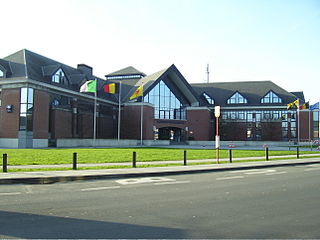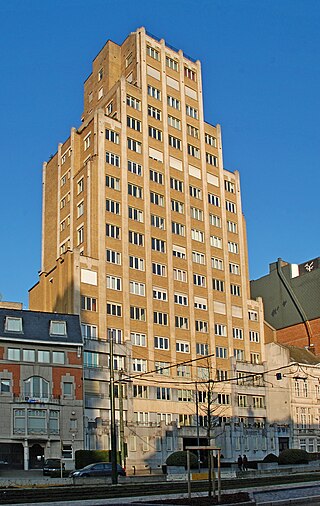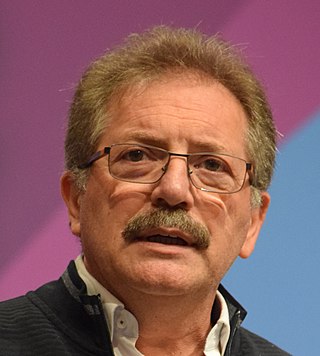Related Research Articles

Brussels, officially the Brussels-Capital Region, is a region of Belgium comprising 19 municipalities, including the City of Brussels, which is the capital of Belgium. The Brussels-Capital Region is located in the central portion of the country and is a part of both the French Community of Belgium and the Flemish Community, but is separate from the Flemish Region and the Walloon Region.

Anderlecht is one of the 19 municipalities of the Brussels-Capital Region, Belgium. Located in the south-western part of the region, it is bordered by the City of Brussels, Forest, Molenbeek-Saint-Jean, and Saint-Gilles, as well as the Flemish municipalities of Dilbeek and Sint-Pieters-Leeuw. In common with all of Brussels' municipalities, it is legally bilingual (French–Dutch).

Waterloo is a municipality in Wallonia, located in the province of Walloon Brabant, Belgium, which in 2011 had a population of 29,706 and an area of 21.03 km2 (8.12 sq mi). Waterloo lies a short distance south of Brussels, and immediately north-east of the larger town of Braine-l'Alleud. It is the site of the Battle of Waterloo, where the resurgent Napoleon was defeated for the final time in 1815. Waterloo lies immediately south of the official language border between Flanders and Wallonia.

The City of Brussels is the largest municipality and historical centre of the Brussels-Capital Region, as well as the capital of the Flemish Region and Belgium. The City of Brussels is also the administrative centre of the European Union, as it hosts a number of principal EU institutions in its European Quarter.

The Résidence de la Cambre is the first high-rise building constructed in Brussels, Belgium. It was built in 1938–39, according to the plans of the architect Marcel Peeters, in a style inspired by New York Art Deco architecture. The 17-story residential tower, which stands at 20, Boulevard Général Jacques/Generaal Jacqueslaan, near the Place de l’Étoile/Sterrenplein in Ixelles, was listed as a protected monument on 14 July 2005. In April 2007, €740,000 were granted by the Government of the Brussels-Capital Region to renovate the facade and roof.

Alexander De Croo is a Belgian politician and businessman who has served as the prime minister of Belgium since October 2020.

The general strike of 1893 was a major general strike in Belgium in April 1893 called by the Belgian Labour Party (POB–BWP) to pressure the government of Auguste Beernaert to introduce universal male suffrage in elections. The general strike was the first called in Belgium and a decisive moment for the nascent socialist movement in Belgium. According to the historian Carl J. Strikwerda, it was the first true general strike in the history of Europe.

The Church of St. John the Baptist at the Béguinage is a Roman Catholic parish church in central Brussels, Belgium. It is dedicated to Saint John the Baptist.
The Lindela Repatriation Centre is a detention centre for undocumented migrants in South Africa. The Lindela Repatriation Centre (Lindela) is one of South Africa's largest facilities for the holding of undocumented migrants. These people are all awaiting determination of their legal status in South Africa. Due to an ever increasing burden on SAPS holding cells and the lack of detention capacity in the country's prisons, the need for a repatriation centre in Gauteng was identified by the Department of Home Affairs. In 1996, Lindela was opened to meet this requirement. It claims to be compliant with all good governance and lawful criteria.
In the run up to the 2024 Belgian federal election, various organisations carry out opinion polling to gauge voting intention in Belgium. The date range for these polls are from the 2019 Belgian federal election, held on 25 May, to the present day. The results of nationwide polls are usually numerically split into the three Belgian regions: Flanders, Brussels, and Wallonia. Federal seat projections for the Chamber of Representatives are presented together under these regional polls.

Nicanor Cué, known as Nico Cué, is a Spanish-born Belgian trade unionist and politician. He served as the General Secretary of the General Federation of Belgian Labour (FGTB) Metalworkers for two decades. In the 2019 European Parliament election, Cué and Violeta Tomić are European Left's lead candidates (Spitzenkandidaten) for the President of the European Commission. He was not elected.

Zakia Khattabi is a Belgian-Moroccan politician who was the co-president of the Ecolo party.
Madjiguène Cissé is a Senegalese activist, former spokeswoman of the undocumented immigrants movement and founder of the Women's Network for Sustainable Development in Africa.

Ou Hongyi, also known by her English name Howey Ou, is a Chinese environmental activist who organises the school strike for climate in Guilin in southern China, calling for more action to limit greenhouse gas emissions by China and thus climate change.

Sammy Mahdi is a Belgian Christian-Democrat politician, a member of CD&V, who in March 2020 became a member of the Belgian Chamber of Representatives. On 1 October 2020, Mahdi became Secretary of State for Asylum and Migration in the new government led by Alexander De Croo.

Pierre-Yves Dermagne is a Belgian politician. As of 1 October 2020, he serves as Minister of Economy and Employment in the De Croo Government led by Prime Minister Alexander De Croo. He is affiliated with the Socialist Party. He won the 2018 communal elections in Rochefort with 2,109 votes over François Bellot. In October 2021, he advocated for a reduction in the work week from five days a week to four.
The Black vests or Black jackets is a French activist organization mostly composed of undocumented immigrants. The group campaigns for the provision of administrative documents for all immigrants, as well as decent housing and living conditions. The Gilets noirs arose partly in response to perceived racist, anti-immigrant, and pro-fascist sentiment among the Yellow vests movement.
The 8 December 2020 incident French: Affaire du 8 décembre 2020 refers to the arrests of nine French citizens who had joined the Kurdish People's Defense Units (YPG) by French authorities in December 2020. Having volunteered to fight with the Kurdish forces against the Islamic State and having returned to France in 2018, they were designated as far-left extremists by the General Directorate for Internal Security and were arrested in a series of raids on 8 December 2020. Seven of the nine were then criminally charged with associations with terrorism. After a few months of detention, however, all except one were released.

Brenda Odimba is a Belgian engineer and activist. Odimba was one of the spokespeople of the 2021 hunger strike of undocumented migrants in Belgium. Odimba founded the association NewSisterhood.
References
- ↑ "Grève de la faim: les sans-papiers veulent rester à l'église du Béguinage jusqu'au traitement des dossiers". lalibre.be. Retrieved 2021-09-27.
- ↑ "Le cri des sans-papiers du béguinage: "On restera jusqu'à la mort s'il le faut" - Édition digitale de Bruxelles". lacapitale.sudinfo.be. Retrieved 2021-09-27.
- ↑ James Kanter (1 September 2021). "A Hunger Strike at the Heart of Europe" (Podcast). EU Scream. Event occurs at 22:00. Retrieved 26 December 2022.
- ↑ "Why undocumented migrants went on hunger strike in Belgium | Human Rights". Al Jazeera. Retrieved 2021-09-27.
- ↑ "Belgium: Hundreds of migrants go on hunger strike - with some stitching their mouths shut | World News | Sky News". news.sky.com. Retrieved 2021-09-27.
- ↑ ""We are Belgium too" pour soutenir l'appel des sans-papiers | Centrale Générale - FGTB". accg.be. Retrieved 2021-09-27.
- ↑ "Grève de la faim des sans-papiers: manifestation de soutien à Bruxelles". Le Soir. 8 July 2021. Retrieved 2021-09-27.
- ↑ "Solidarité avec les sans-papiers en direct d'Avignon". lalibre.be. Retrieved 2021-09-27.
- ↑ "'Dying to be regularised': 100+ artists and thinkers sign open letter in support of Brussels' hunger strikers - DiEM25 Communications". diem25.org. 15 July 2021. Retrieved 2021-09-27.
- ↑ "Grève de la faim des sans-papiers: 250 personnes manifestent leur soutien en face de Bruxelles-Central" [Hunger strike of undocumented workers: 250 people show their support at Bruxelles-Central]. L'Avenir (in French). 17 July 2021. Retrieved 21 November 2022.
- ↑ "Alarm grows over migrants' hunger strike in Brussels | Belgium". The Guardian. 20 July 2021. Retrieved 2021-09-27.
- ↑ "A migrant hunger strike is shaking Belgium's government". POLITICO. 21 July 2021. Retrieved 2021-09-27.
- ↑ "Belgian govt announces breakthrough in migrant hunger strike". apnews.com. 21 July 2021. Retrieved 2021-09-27.
- ↑ "Migrants in Brussels end mass hunger strike for legal status after 60 days | Belgium". The Guardian. 22 July 2021. Retrieved 2021-09-27.
- ↑ Walker, Lauren (2 November 2021). "'We were deceived': Hunger strikers accuse government of betrayal". The Brussels Times. Retrieved 26 December 2022.
- ↑ Chini, Maïthé (4 June 2022). "'Kafkaesque': Just one in six hunger strikers in Brussels church get residence permit". The Brussels Times. Retrieved 26 December 2022.